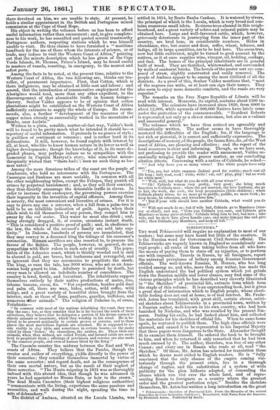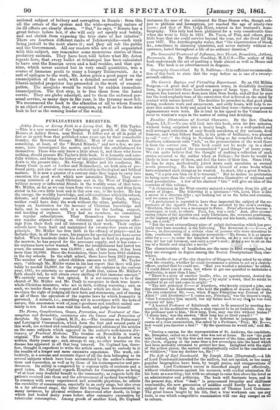TCHINOVNICKS.`
THE word Teliinovnick will require no explanation to most of our readers ; but some may have heard but little of the creature. It is the Russian word for Government Civil Service official. The Tehinovnioks are vaguely known in England as scandalously cor- rupt people; all ranks of them taking bribes from all who have the means of paying them to stave off an injustice, or to perform one with impunity. Travels in Russia, by all foreigners, report the universal prevalence of bribery among Russian Government officials. The well-known Russian, M. Herzen, who has long resided among us, and who, more than any writer, has made the English understand the bad political system which yet grinds down the Russian middle and lower classes, may find some of the vicious principles which he has described very cleverly illustrated in " the Sketches" of provincial life, extracts from which form the staple of this volume. It is an unpretending book, but it gives a great deal of information which to English people, whose chari- table feeling does not end at home, is of real interest. Mr. Frede- rick Aston has translated; with great skill, certain clever, satiri- cal sketches about Tohinovnicks in a provincial town, written by a Russian author, well-known in his own country, who had been banished by Nicholas, and who was recalled by the present Em- peror. During his exile, he had looked about him, and collected the materials for his sketches of official life. When he came home again, he ventured to publish them. The high class officials were alarmed, and caused it to be represented to his Imperial Majesty that these papers were dangerous to the State. Alexander thought fit to examine them himself. He ordered the book to be brought to him, and when he returned it only remarked that he had been much amused by it. The author, therefore, was free of any other Censor ; and every one in Russia who reads at all, read. " the Sketches." Of these, Mr. Aston has selected for translation those which he deems most suited to English readers. He is "fully convinced that the only chance of the empire ooming vic- toriously through the present crisis, lies in a thorough change of tagtics, and the substitution of a system of wide publicity for `the plan hitherto adopted, of concealing the abuses which run not over the whole land, and of repre- senting Russia to foreigners as a country where the greatest order and the greatest perfection reign." Besides the sketches themselves, Mr. Aston has written a long introduction on the great • Tchinovnicks : Sketches of Provincial Life. From the Memoirs of the retired Conseiller de Cour Stchedrin (Saltikow). Translated, with Notes from the Russian, by Frederick Aston. Published by Booth.
national subject of bribery and corruption in Russia : from this all the errors of the system and the wide-spreading nature of its ill effects are clearly shown. " But," he says, " Russia has a great future before her, if she will only act openly and boldly, and not shrink from exposing the true state of her interior." There are fourteen different ranks of Tchinovnicks—each rank being jackall to the next above it; and they all rob the public and the Government. All our readers who are at all acquainted with this subject, can remember some monstrous stories of these predatory animals. They have been told before what Mr. Aston repeats here, that every bullet at Sebastopol has been calculated to have cost the Russian seven and a half roubles, and that qui- nine, which never existed but in very small quantities, was a source of immense profit to many a hungry Tohinovuick. As a sort of epilogue to the work, Mr. Aston gives a good paper on the emancipation of the serfs, with a detailed account of how one liberal-minded proprietor has proceeded in the work of emanci- pation. The moujieks would be ruined by sudden immediate emancipation. The first step, is to free them from the hated corvee. They are glebe) adscripti, and to them the enforced per- sonal service, so many days in the year, is the tyranny most felt. We recommend the book to the attention of all to whom Russia is an object of aversion, fear, or suspicion, as well as to those who look to her as the ooming leader of the world.



























 Previous page
Previous page